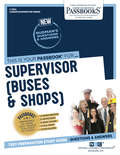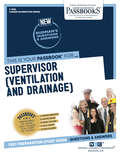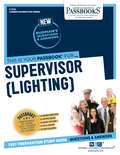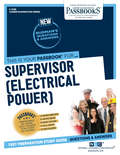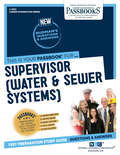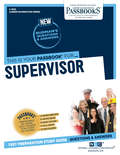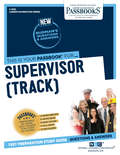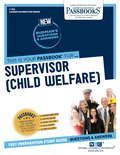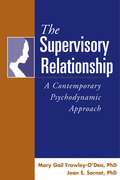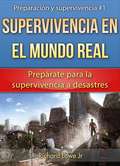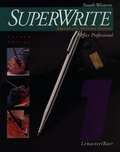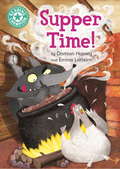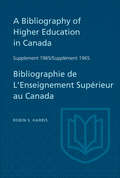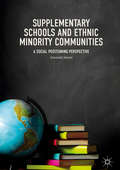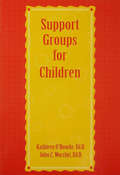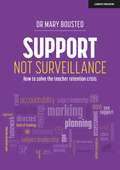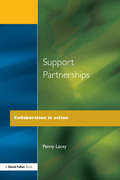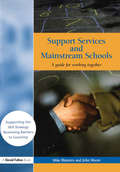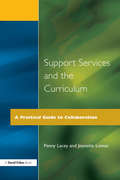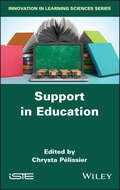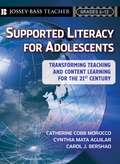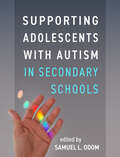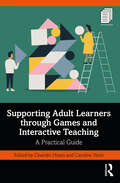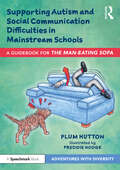- Table View
- List View
Supervisor: Passbooks Study Guide (Career Examination Series #C-3510)
by National Learning CorporationThe Supervisor (Buses and Shops) Passbook® prepares you for your test by allowing you to take practice exams in the subjects you need to study. It provides hundreds of questions and answers in the areas that will likely be covered on your upcoming exam.
Supervisor: Passbooks Study Guide (Career Examination Series #C-3510)
by National Learning CorporationThe Supervisor (Ventilation and Drainage) Passbook® prepares you for your test by allowing you to take practice exams in the subjects you need to study. It provides hundreds of questions and answers in the areas that will likely be covered on your upcoming exam.
Supervisor: Passbooks Study Guide (Career Examination Series #C-3510)
by National Learning CorporationThe Supervisor (Lighting) Passbook® prepares you for your test by allowing you to take practice exams in the subjects you need to study. It provides hundreds of questions and answers in the areas that will likely be covered on your upcoming exam.
Supervisor: Passbooks Study Guide (Career Examination Series #C-3510)
by National Learning CorporationThe Supervisor (Electrical Power) Passbook® prepares you for your test by allowing you to take practice exams in the subjects you need to study. It provides hundreds of questions and answers in the areas that will likely be covered on your upcoming exam.
Supervisor: Passbooks Study Guide (Career Examination Series #C-3510)
by National Learning CorporationThe Supervisor (Water & Sewer Systems) Passbook® prepares you for your test by allowing you to take practice exams in the subjects you need to study. It provides hundreds of questions and answers in the areas that will likely be covered on your upcoming exam, including but not limited to: supervision; water distribution systems and fire hydrants; installing, repairing and servicing fire hydrants, valves and water service boxes and maintaining water lines; sanitary and storm sewer systems; sewer system safety and trenching practices; understanding and interpreting technical information and construction and site plans; and more.
Supervisor: Passbooks Study Guide (Career Examination Series #C-3510)
by National Learning CorporationThe Supervisor Passbook® prepares you for your test by allowing you to take practice exams in the subjects you need to study. It provides hundreds of questions and answers in the areas that will likely be covered on your upcoming exam.
Supervisor: Passbooks Study Guide (Career Examination Series #C-3546-9)
by National Learning CorporationThe Supervisor (Track) Passbook® prepares you for your test by allowing you to take practice exams in the subjects you need to study. It provides hundreds of questions and answers in the areas that will likely be covered on your upcoming exam.
Supervisor: Passbooks Study Guide (Career Examination Series #C-784)
by National Learning CorporationThe Supervisor (Child Welfare) Passbook® prepares you for your test by allowing you to take practice exams in the subjects you need to study. It provides hundreds of questions and answers in the areas that will likely be covered on your upcoming exam, including but not limited to; Social services supervision including staff training and development; Performance evaluation; Problem solving and decision making; Preparation and interpretation of written material; and more.
Supervisory Relationship
by Mary E. Sarnat Mary Gail Frawley-O'DeaIn the past two decades, many psychodynamic therapists have begun to view the relational processes taking place between patient and therapist as a central source of transformation. Yet traditional paradigms of clinical supervision, focusing primarily on didactic teaching, have limitations for training therapists to work in these new ways. This groundbreaking volume is the first to elaborate a comprehensive contemporary model of supervision. Using a wealth of examples and vignettes, the authors show how working within the vicissitudes of the supervisory relationship can allow the supervisee to gain a deeper understanding of the treatment method being taught. Key topics discussed include issues of power and authority, regression in the supervisory relationship, rethinking the "teach/treat" question, parallel process as a relational phenomenon, working with group process in case conference, and the role of the organization in supporting training. This is a richly informative resource for psychologists, psychiatrists, social workers, psychoanalysts, and others involved in clinical supervision and training. It also will serve as a text for courses in supervision and organizational psychology.
Supervivencia en el mundo real: Prepárate para la supervivencia a desastres
by Richard G Lowe Jr Vanessa Pérez RodríguezSupervivencia en el mundo real: Prepárate para la supervivencia a desastres por Richard G Lowe Jr ¿Y si pudieras mejorar drásticamente tus posibilidades de sobrevivir a un gran desastre? Seguridad para ti y tu familia sin tirar la casa por la ventana. ¿Y si pudieras mejorar drásticamente tus posibilidades de sobrevivir a un gran desastre? Imagínate que puedes asegurar que tus hijos y otros familiares están a salvo después del "gran terremoto" o de un huracán. Imagina cómo te sentirías siendo el único en tu vecindario con suficiente comida y agua. El especialista en recuperación de desastres y entrenado a través del Equipo Comunitario de Respuesta a las Emergencias (CERT en inglés), Richard Lowe, te explica cómo hacer que tú, tu familia y tus amigos estéis preparados ante cualquier desastre, ya sea pequeño o grande. Basado en su entrenamiento especializado, en entrevistas con expertos y en su experiencia personal, Lowe contesta la gran pregunta: ¿cuál es el secreto para mejoras las posibilidades de supervivencia incluso después de un gran desastre? Con este libro aprenderás: Por qué no puedes depender de los cuerpos de bomberos y de policía durante un desastre, y qué hacer en ese caso Cómo puede mantenerte a salvo a ti, a tu familia y a tus hijos el saber más ¿Realmente sabes qué tipos de desastres pueden ocurrir en tu zona? Aprenderás a descubrirlo Cómo crear un plan de desastres que realmente funcione Cómo asegurarte de que tu familia y tus hijos entiendan qué hacer durante un desastre Cómo hacer saber a otras personas que tú y tu familia estáis a salvo Cómo preparar tu casa para las emergencias Qué tipo de comida, agua y otras provisiones se necesitan Cómo prepararte para las salidas o viajes Qué hacer cuando se desata el desastre Cómo crear una "bolsa de viaje" Qué hacer cuando tienes que evacuar la zona Compra este libro AH
Superwrite: Alphabetic Writing System, Office Professional (Volume 1, 2nd Edition)
by A. James Lemaster John BaerVolume One introduces SuperWrite theory and beginning transcription principles. The step-by-step approach to writing principles guides students to alphabetic writing success. Eight lessons develop personal success factors such as goal-setting, problem-solving, time management, attendance, and promptness. Updated keyboarding style references reflect current business practices.
Supper Time!: Independent Reading Turquoise 7 (Reading Champion #694)
by Damian HarveyWolf is hungry and he fancies chicken for supper. But the little chicken doesn't fancy being eaten at all!Reading Champion offers independent reading books for children to practise and reinforce their developing reading skills.Fantastic, original stories are accompanied by engaging artwork and a reading activity. Each book has been carefully graded so that it can be matched to a child's reading ability, encouraging reading for pleasure.Independent Reading Turquoise 7 stories are perfect for children aged 5+ who are reading at book band 7 (Turquoise) in classroom reading lessons.
Supplement 1965 to A Bibliography of Higher Education in Canada / Supplément 1965 de Bibliographie de L'Enseighnement Supérieur au Canada
by Robin HarrisThis Supplement to the 1960 Bibliography by Harris and Tremblay adds some 3,500 entries to the approximately 4,000 listed in the first volume, providing a full list of articles, books, pamphlets, and theses bearing on all aspects of higher education in Canada for the period 1959-1963. The organization of the earlier volume has been maintained with slight modifications, and some new sections have been added, including one devoted to institutions which, although they are post-secondary, do not grant degrees; and one which includes plays and novels set wholly or in part in actual or fictitious Canadian universities. (Studies in Higher Education in Canada, No. 3)
Supplementary Schools and Ethnic Minority Communities: A Social Positioning Perspective
by Amanda SimonThis book provides a unique perspective into the world of supplementary schooling, exploring both the social positioning of these schools and the ethnic minority communities they serve. The author presents a close examination of the establishment and functioning of supplementary schools which offers a fresh and novel insight into acculturation processes. Drawing on empirical data gathered from staff interviews, classroom observations and interactive recordings, this book explores the operation of supplementary schools as sites of identity construction where the community identities are preserved, defended, renegotiated and reconstructed. The various modes of construction are indicative of the acculturation experiences of ethnic minority communities and the ways in which these communities negotiate residence in one country whilst having roots in another. This book therefore offers a revealing conceptualization of supplementary schools, not merely as educational spaces, but socio-political enterprises that are situated within and respond to various historical, social and political contexts. This pioneering work will appeal to students and scholars in the fields of education, migration and identity.
Support Groups For Children
by John C. Worzbyt Kathleen O'RourkeDesigned for use with children in grades K-6, this book provides a review of support groups: their nature and value; the tripartite model of children's needs, behaviours they need to learn and environmental conditions that support learning; the Keystone Learning Model, which encompasses the tripartite model, strengths and decision-making; and 'nuts and bolts' suggestions for creating and managing child support groups. The book also addresses various support groups chapter by chapter and homework ideas are provided with each chapter.
Support Not Surveillance: How to solve the teacher retention crisis
by Mary BoustedWhy are so many teachers leaving the profession increasingly early in their careers? What harm is being done to pupils' educational prospects by persistent teacher shortages? Why are teachers held uniquely responsible for the effects of poverty on children’s progress and attainment? What are the unintended consequences of rushed government education policy-making? And what can be done about all of the above?Supported by the latest international and national evidence, Support Not Surveillance seeks to address these important questions. Laying bare how the inadequacy of Westminster policies is compounded by an unfair Ofsted inspection regime, Dr Mary Bousted draws on her years of expertise and access to decision-makers to expose the gap between ministerial rhetoric and the daily reality encountered by teachers in their classrooms across England.Ending on a set of proposals to move beyond the seemingly perennial crisis in teacher recruitment and retention, Support Not Surveillance is an unflinching call to end the failed experiment of government interventionism in classrooms.
Support Not Surveillance: How to solve the teacher retention crisis
by Mary BoustedWhy are so many teachers leaving the profession increasingly early in their careers? What harm is being done to pupils' educational prospects by persistent teacher shortages? Why are teachers held uniquely responsible for the effects of poverty on children’s progress and attainment? What are the unintended consequences of rushed government education policy-making? And what can be done about all of the above?Supported by the latest international and national evidence, Support Not Surveillance seeks to address these important questions. Laying bare how the inadequacy of Westminster policies is compounded by an unfair Ofsted inspection regime, Dr Mary Bousted draws on her years of expertise and access to decision-makers to expose the gap between ministerial rhetoric and the daily reality encountered by teachers in their classrooms across England.Ending on a set of proposals to move beyond the seemingly perennial crisis in teacher recruitment and retention, Support Not Surveillance is an unflinching call to end the failed experiment of government interventionism in classrooms.
Support Partnerships: Collaboration in Action
by Penny LaceyThe challenges and possibilities for collaborative support partnerships across the range of special needs are thoroughly explored in this practical book based on current research. Case studies are used to illustrate practice that is achievable yet forward thinking drawn from a variety of services and age phases. This book gives guidance for the sharing of practice, and advice for those wishing to embark upon or improve the way in which they work with other people and services.
Support Services and Mainstream Schools: A Guide for Working Together
by John Moore Mike BlamiresFirst Published in 2005. Routledge is an imprint of Taylor & Francis, an informa company.
Support Services and the Curriculum: A Practical Guide to Collaboration
by Penny Lacey Jeanette LomasFirst Published in 1993. Routledge is an imprint of Taylor & Francis, an informa company.
Support in Education
by Chrysta PélissierThis book aims to reflect the contours of the notion of aid as it is questioned by current scientific research. This notion appears as fuzzy in its scope of intervention, in its methods of multidisciplinary and multi-referential approaches in theoretical frameworks convened. Present in different areas that we propose to investigate in the book (training and teaching at university, inclusion in education, but also prevention, the fight against failure in orientation), the notion of help questions research in SHS and Computer Science. It comes in different formats labeled "help" but also "support", "support" or "guidance". In order to take stock of these notions and to question their differences, we convoke several authors (French and foreign) who participate by their research (-action) underlining components and environmental factors of the device that give this notion any its thickness.
Supported Literacy for Adolescents: Transforming Teaching and Content Learning for the 21st Century
by Catherine Cobb Morocco Cynthia Mata-Aguilar Carol J. BershadSupported Literacy for Adolescents, written by nationally recognized experts, introduces an innovative and field-tested instructional framework for preparing secondary students to succeed academically in a fast-changing and globally networked world.<P><P> Filled with examples from science, history, literature, and special education classrooms, the book shows how teachers can enable diverse students, including under-performers, to develop critical thinking and other essential competencies along with the "multi-literacy" tools needed to engage in twenty-first century content learning.
Supporting Adolescents with Autism in Secondary Schools
by Samuel L. OdomIn a convenient large-size format, this book presents the first research-based, comprehensive program designed to support high school students with autism spectrum disorder (ASD). Developed and tested in public schools by the Center on Secondary Education for Students with Autism Spectrum Disorder (CSESA), the program addresses four critical areas--literacy, social competence and peer relationships, independence, and postschool transition preparation for students and their families. Chapters provide a roadmap for implementation of each component, complete with intervention guidelines, case vignettes, key findings, lessons learned, and reproducible forms that can be downloaded and printed at the companion website. The book also helps readers navigate the wealth of additional resources freely available from CSESA.
Supporting Adult Learners through Games and Interactive Teaching: A Practical Guide
by Caroline Varin Chandni HiraniGames-based teaching offers an engaging way for students and adult learners to interact with concepts and build their problem-solving and communication skills. This exciting book will help educators integrate games into their classes and shows how this method of teaching improves motivation, as well as diversifies and solidifies learners’ skill sets. Bringing together expert contributors from the Professors Without Borders’ global network who have effectively used interactive games-based approaches in their teaching, the book features 13 unique games that teach a wide variety of skills across a range of difficulty levels. The chapters highlight the skills of strategy, decision-making, communication, teamwork, problem-solving, reflective thinking and empathy being used by participants alongside the pedagogical principles that underpin each game. Suitable for online and in-person teaching, this book will be valuable reading for educators working with student and adult learners looking to adopt innovative and interactive teaching methods, as well as those interested in learning about how game-based teaching can improve vital skills.
Supporting Autism and Social Communication Difficulties in Mainstream Schools: A Guidebook for ‘The Man-Eating Sofa’ (Adventures with Diversity)
by Plum HuttonThis guidebook is designed to be used alongside the storybook The Man-Eating Sofa (for 8-12 year-olds). Written in an engaging and accessible style, chapters explore the educational, social and psychological impact of autism and social communication and interaction difficulties (SCID). Strategies are provided to help parents and practitioners recognise and support these issues in the school environment. A chapter-by-chapter exploration of The Man-Eating Sofa provides an opportunity to generate discussion and facilitate understanding of autism and SCID amongst young people and adults who might not have considered the impact of social communication difficulties upon day-to-day life. Key features include: an accessible introduction to autism and SCID discussion points for use with The Man-Eating Sofa, to accompany young people’s reading of the story strategies are provided to support the education, mental health and wellbeing of young people who find social communication, interaction, sensory processing and emotional regulation challenging in mainstream educational settings. This is an essential resource to help parents, teachers and professionals understand and support pupils who are autistic as well as those who find social communication a challenge in the mainstream classroom.
